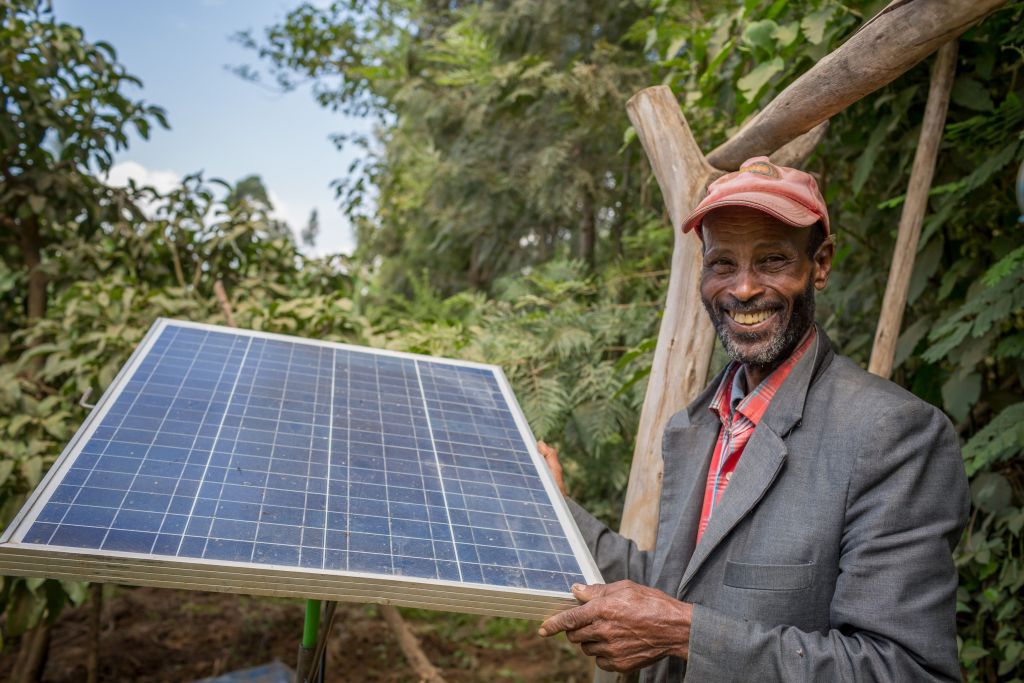
“We will give due attention to the agricultural sector to bring about a fundamental change, to convert our deserts into paradise and to increase product and productivity by implementing irrigation works extensively and in a coordinated manner, by investing intensively in pastoralist and semi-pastoralist areas and developing regions.”
These were the words spoken by Ethiopian Prime Minister Abiy Ahmed at Millennium Hall on April 16th 2018, right after he took office. In this important speech to the nation, he targeted irrigation as a major development intervention for the country.
In May of 2019, the Ethiopian Ministry of Finance (MoF) signed a historic tax reform bill that is slated to remove almost all duty tax on irrigation, mechanization and animal feed equipment and technologies. This decision was brought about, in part, by a collaboration between the International Water Management Institute (IWMI) in Ethiopia, which leads the CGIAR Research Program on Water, Land and Ecosystems (WLE), and the Agricultural Transformation Agency (ATA) of Ethiopia.
IWMI researchers in Addis Ababa have been researching irrigation for years, and the institute’s commitment to developing irrigation in Ethiopia, as well as in the rest of East Africa, has been duly recognized by important stakeholders. IWMI currently leads the irrigation advisory group for the Ethiopian Ministry of Water Resources, acts as the secretary of the Agricultural Water Management Platform led by the Ministry of Agriculture, and signed an MOU with the ATA in 2017.
“Whenever we have a question about irrigation, we ask IWMI,” said Seyoum Getachew, former Director of the Household Irrigation Program for the ATA.
Finding workable solutions for smallholders
This reputation has been a long time in the making. The AgWater Solutions project, which was carrying out research in a South Asia and Sub-Saharan Africa on improving agricultural water management for smallholder farmers, produced a number of recommendations for Ethiopia starting in 2009. These recommendations outlined some of the major opportunities and bottlenecks in expanding irrigation for improved food security and poverty reduction in the country.
In addition to identifying the availability and suitability of groundwater, one key finding was that water lifting technologies, particularly motorized pumps, were too expensive for smallholder farmers to purchase and operate. In addition to import taxes, the technologies were subject to a number of national taxes, bringing the total VAT up to 37% of the cost of the pumps.
In order to reduce the cost of these technologies and encourage their use, the researchers recommended that there be a ‘pro-poor’ tax exemption on mechanized irrigation technology. This way, the price of these technologies would be significantly reduced in one fell swoop.
At the same time, the government of Ethiopia was working to promote irrigation as a strategy for its agricultural sector, which is largely made up of smallholder farmers. Through the ATA, they were exploring methods of improving uptake of shallow groundwater irrigation technologies across the country.
Matching up with and influencing policy
Stakeholder meetings were held at the conclusion of the AgWater Solutions project, and IWMI used its national networks to invite relevant practitioners and policy makers, including Seyoum Getachew and the ATA. IWMI presented recommendations for Ethiopia alongside success stories from other AgWater Solution project sites, including Bangladesh, where a progressive tax exemption had led to the uptake of irrigation technologies in the country.
The argument that reducing taxes on pumping technologies would improve uptake attracted the attention of Getachew. Building on the information gleaned from the seminar, the ATA carried out an assessment of the shallow groundwater potential of Ethiopia using data from the British Geological Survey. They concluded that increasing smallholder access to the technology could unlock 4 billion cubic meters of groundwater and irrigate an additional 2 million ha or agricultural land.
These massive figures were presented to the Ethiopian Transformation Council, which was headed by the former Prime Minister, Hailemariam Desalegn. Convinced that a tax exemption of this kind, if implemented properly, would benefit smallholder farmers, the Transformation Council accepted the initiative, suggesting that the tax exemption be taken even further to cover other agricultural machinery, such as tractors or combines.
What followed was another assessment by the ATA, which looked at the potential benefits of an agricultural mechanization tax exemption. The results were approved by the Ministry of Agriculture in 2017, and, in May of 2019, the implementation of the tax exemption was approved by the Ministry of Finance.
At this stage, IWMI is again being consulted by ATA to put together implementation guideline scenarios for how the tax exemption would actually benefit farmers on the ground, and not just importers and retailers of irrigation technology. Once these guidelines are established, they will be presented to the Ministry of Agriculture and the Ministry of Finance.
Originally posted on the CGIAR Research Program on Water, Land and Ecosystems (WLE) website.

